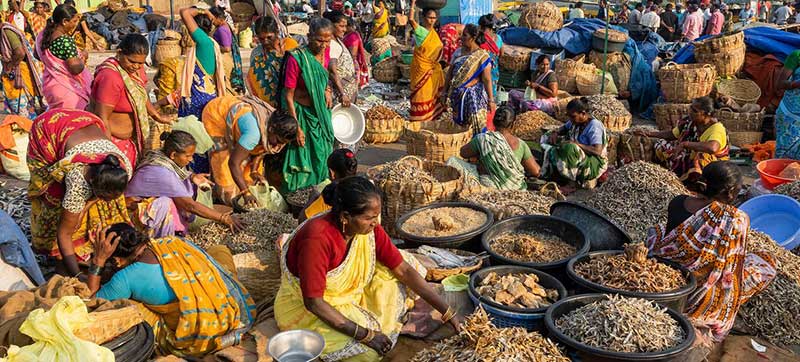 Global Food System
Global Food System
Global food systems ‘broken’, says UN chief, urging transformation in how we produce, consume food
New York: UN Secretary-General António Guterres on Monday highlighted the need to address global hunger, promote cooperation between businesses and governments, and mitigate the damaging impact of continuing climate change on food production.
Addressing the UN Food Systems Summit +2 Stocktaking Moment, in Rome, Mr. Guterres said that in a world of plenty, “it is outrageous that people continue to suffer and die from hunger.”
Broken system
“Global food systems are broken - and billions of people are paying the price.”
According to UN estimates, over 780 million people experience hunger, almost one-third of all food produced globally is lost or wasted and nearly three billion people cannot afford healthy diets.
Developing countries face additional challenges, as limited resources and debt burdens prevent them from investing fully in food systems which can produce to nutritious food across the social spectrum.
Unsustainable food production, packaging and consumption are also contributing to the climate crisis, accounting for a third of all greenhouse gas (GHG) emissions, 70 per cent of the world’s freshwater usage, and driving biodiversity loss.
Grain deal collapse hits vulnerable
The recent termination of the Black Sea Initiative by Russia has further exacerbated the situation, Mr. Guterres said.
It enabled the export of millions of metric tons of food from Ukrainian ports, and together with the UN’s parallel accord with Russia on export of food and fertilizer, had been vital for global food security and price stability.
“With the termination of the Black Sea Initiative, the most vulnerable will pay the highest price,” he added, emphasizing that both Russia and Ukraine are crucial to global food security, urging Moscow to reverse course.
The UN chief said he remains committed to enabling unimpeded access to global markets for food and fertilizers from both countries, “and to deliver the food security that every person deserves.”
Three key areas for action
In his address, the UN chief cited three key areas for action, starting with “massive” investment in sustainable food systems.
“Starving food systems of investment means, quite literally, starving people,” he said, calling on governments to respond to UN’s call for an SDG Stimulus, amounting to at least $500 billion annually to support long-term financing for all countries in need.
Second, Mr. Guterres called on governments and businesses to collaborate and “put people over profit” in building food systems.
This involves exploring new ways to increase the availability of fresh, healthy food for all individuals, keeping food markets open, and removing trade barriers and export restrictions, he said.
Environmental sustainability
With food systems playing a key role in reducing carbon emissions and limiting global warming to 1.5 degrees Celsius, the Secretary-General called for food systems that reduce the carbon footprint of food processing, packaging, and transportation.
Harnessing new technologies to reduce the unsustainable use of land, water, and other resources in food production and agriculture is vital, he said, urging “stronger and faster action” to tackle the climate crisis and commit to reaching net-zero emissions by 2040 for developed countries and 2050 for emerging economies.
Assessing progress
Also speaking at the opening, Qu Dongyu, Director-General of the UN Food and Agriculture Organization (FAO), highlighted the importance of assessing progress in agrifood systems transformation towards reaching the 17 SDGs, agreed by all the world’s nations in 2015.
He noted the progress in identifying solutions agrifood systems can provide for better production, better nutrition, a better environment and a better life, including more sustainable farming, efficient water management, responsible packaging, reforestation and reduced food waste.
Mr. Qu added that these depended on transforming global agrifood systems to be more efficient, inclusive, resilient, and sustainable.
“In the face of increasing uncertainties and multiple crises, we need to urgently undertake this transformation to fulfil the high expectations we have from our agrifood systems,” he said.
The Summit
From 24 to 26 July, the UN Food Systems Summit +2 Stocktaking Moment will convene over 2,000 participants from over 160 countries to review progress on the commitments made at the first Food Systems Summit in 2021, and identify successes, as well as continuing bottlenecks while refocusing priorities.
It includes a series of high-level events, dialogues and side events related to transforming agrifood systems on topics such as food waste, climate change, healthy diets, partnerships, science and technology, indigenous people’s knowledge, and transportation.
Support Our Journalism
We cannot do without you.. your contribution supports unbiased journalism
IBNS is not driven by any ism- not wokeism, not racism, not skewed secularism, not hyper right-wing or left liberal ideals, nor by any hardline religious beliefs or hyper nationalism. We want to serve you good old objective news, as they are. We do not judge or preach. We let people decide for themselves. We only try to present factual and well-sourced news.







